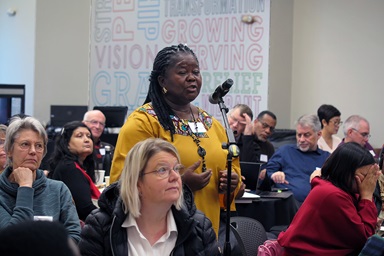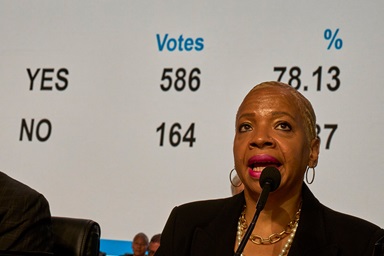It is vital to continue peace talks between the Philippines’ armed forces and national police and the New Peoples' Army, say the member churches of the National Council of Churches in the Philippines.
The United Methodist Church was among the denominations represented during a Feb. 24 press conference at the offices of the United Church of Christ in the Philippines in Madapo Hills, Davao City. The event was spearheaded by Sowing the Seeds of Peace in Mindanao and Exodus for Justice and Peace.
"Please desist now from violence,” said United Methodist Bishop Rodolfo Juan of the Davao area as he read a statement. “Stop killing the poor."
Other council members who participated represented the Episcopal Church of the Philippines, Philippine Independent Church and United Church of Christ.
Philippines President Rodrigo Duterte announced in early February that the government was scrapping a ceasefire with the New People's Army, Reuters News Service reported, saying it “was making huge, unacceptable demands” at peace talks in Rome despite government concessions.
Juan, who currently serves as vice chair of National Council of Churches in the Philippines, said the intention of the press event was to call "for the cessation of the ongoing offensives on both sides — the Armed Forces and Philippine National Police against New Peoples' Army — as a result of the breakdown of peace talks."
He read a statement from the United Methodist College of Bishops and the Philippines Central Conference Board of Church and Society, appealing to Duterte “to reconsider his pronouncement about terminating the peace talks, pave the way for the resumption of discussions, return to the negotiating table."
Such a termination, the statement said, “will only resume the peril which an all-out war has brought into our midst since its beginning, leaving tens of thousands of combatants and civilians dead."
"Human rights violations will only increase without resolving the roots of conflict."
The United Methodist statement noted that the poor “are the real stakeholders in the talks, and are expecting that the next steps in the peace process would tackle significant issues and help bring about socioeconomic reforms. “Most importantly, with peace talks, the people will keep on finding hope in the prospects for peace."
Statements in support of peace talks from other church-related groups and congregations also were read.
The Rev. Israel Painit, the Chair of Philippines Church and Society said that joining the press conference demonstrated the urgency to have a peaceful solution.
"What is urgent is peace itself,” he said. “We believe that nobody wins in war. The Church must be the first to stand as a whole to invoke peace.”
Mangiduyos is a United Methodist News Service correspondent based in the Philippines. News media contact: Vicki Brown, Nashville, Tenn., (615) 742-5470 or [email protected]. To get more United Methodist news, subscribe to the free Daily or Weekly Digests.
Like what you're reading? Support the ministry of UM News! Your support ensures the latest denominational news, dynamic stories and informative articles will continue to connect our global community. Make a tax-deductible donation at ResourceUMC.org/GiveUMCom.




